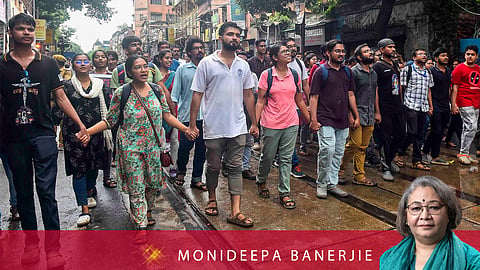

It was Kolkata's own Tahrir Square moment, its own Shahbagh. Actually, let me revise that. I watched Tahrir Square very closely on TV. I saw Shahbagh with my own eyes, having had the opportunity to report on that movement in Dhaka. But Kolkata today is perhaps even more extraordinary. All of Kolkata today became the hallowed ground of the most astonishing peoples protest ever. In the 77 years of its Independence, I dare say India has not seen anything like it.
With a grating, metallic screech, the nine-foot-high metal barricades were dragged aside on Tuesday afternoon by policemen on the narrow BB Ganguly Street in central Kolkata. The road leads to Lalbazar, the headquarters of the Kolkata Police.
Rising over the cacophony were the strains of We Shall Overcome, the American civil rights song, and the Bengali anthem of protest, Kazi Nazrul Islam's Karar Oi Louho Kopat Bhang -- break down the iron gates of the prison. The singers, all junior doctors who had been camping at the location through rain, shine and a hot muggy night for the last 22 hours, gathered to demand justice for their colleague, raped and murdered in their hospital while she was on duty on the night of August 9.
In the hands of the junior doctors who marched slowly forward singing those songs, meaning every word in those powerful lyrics, were rajanigandhar malas -- garlands of tuberose speckled with red roses.
One doctor held aloft what must be the movement's icon: a plastic replica of the human spine.
These doctors have demonstrated in full over the last 24 days that their vertebral column is in place. Their unique protest exhorted everyone to keep theirs upright and straight. Especially the police.
For it was the police that failed junior doctors at RG Kar Hospital and Medical College on August 14 when they couldn't contain vandals who broke down police barricades at the gate and ransacked the Emergency ward and more in the same building where the junior doctor had been raped and killed.
The very same police had responded to the junior doctors' demand for a meeting with the Commissioner of Kolkata Police on Monday, September 2, by setting up nine-foot-tall metal barricades across the narrow BB Ganguly Street.
Agreed, it was a bit awkward for the cops. Because the doctors wanted to meet the commissioner of Kolkata Police and demand that he resigns from his post. But still. When the protesting doctors arrived at the barricades with red roses in their hand and nothing else, the police should have calibrated their response. As they were forced to, 22 hours later. The police had to themselves remove the barricades and let the doctors march forward a 100 metres closer to Lalbazar.
A small 100-metre step for the doctors, but a giant leap for their fight for justice, for all fights for justice. Across the world. Forever.
Just before heading into Lalbazar, the doctors' delegation broke into a song again, signing off with Jana Gana Mana Adhinayaka Jaya He, Bharat Bhagya Vidhata. Behind them, other doctors standing in a series of human chains joined in. Everyone stood still. Time stood still.
After the meeting with the commissioner of Kolkata Police, the doctors said they were not satisfied with the officer's responses but they would end their sit-in demo on BB Ganguly Street. However, their protests would continue in other forms. Setting the pace, the doctors cleared the remnants of their 22-hour sit-in from BB Ganguly Street. One night this week, the junior doctors called for a voluntary blackout in every home in Kolkata for sixty minutes, with only candles to be lit through the dark hour.
Kolkata has responded magnificently. All of Tuesday, thousands of people stood holding hands all along the 16 km stretch of the arterial Eastern Metropolitan Bypass road that swings around the city. No blocking traffic, no political flags, only banners and posters demanding justice for the RG Kar victim and an occasional burst of slogans, mostly Justice for RG Kar. In the human chain were doctors, nurses, students and scores of ordinary folk, shocked at the rape and murder of the RG Kar doctor, moved by the movement for justice by her fellow doctors and outraged by the way the state has handled both.
Collectively, Kolkata is today a tsunami of righteous anger. An anger it has chosen to express with the red rose.
Mahatma Gandhi would have approved.